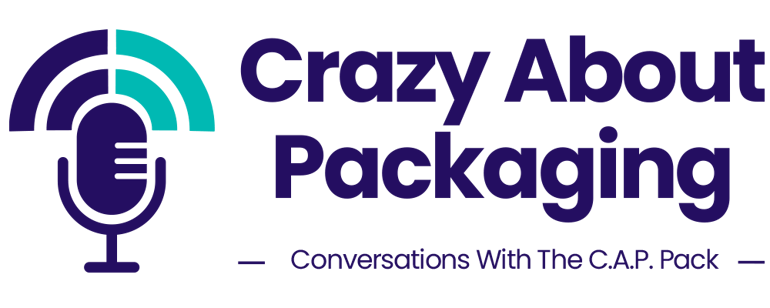
The conversation around microplastics is dominated by myths and misinformation — but what’s the truth about microplastics? In this episode of Crazy About Packaging, Natalie, Mike, and Jonathan welcome back Dr. Chris DeArmitt, a globally recognized plastics expert, author of two free books about the myths surrounding plastic, and a passionate advocate for science-based solutions to environmental challenges.
Dr. DeArmitt shares insights from his extensive research into microplastics, offering a data-driven perspective on topics ranging from health risks to environmental impacts. If you’ve ever wondered whether microplastics are as harmful as headlines suggest or whether alternatives to plastic are truly better for the environment, this episode is a must-listen.
Sneak Peek for Season 2, Episode 6
Catch the full episode of Crazy About Packaging on Spotify, Apple Podcasts, or our website. For now, here’s a glimpse into the key highlights of our discussion, uncovering the truth about microplastics.
Meet Dr. Chris DeArmitt
Dr. Chris DeArmitt is a world-renowned chemist, independent environmental expert, and author of The Plastics Paradox. Dr. DeArmitt is no stranger to questioning conventional wisdom. His journey into plastics advocacy began when his daughters came home from school with misinformation about plastics. "Teachers told them plastics don’t degrade, and that made my blood boil," he shared. That moment inspired him to embark on a mission to uncover the truth about plastics and share his findings with the world.
Dr. DeArmitt has since become a trusted resource for governments, corporations, and academic institutions seeking accurate information about plastics and sustainability. His upcoming book, Shattering the Plastics Illusion, builds on the success of The Plastics Paradox, offering updated data and insights to debunk common myths about plastics.
This is Dr. DeArmitt’s second appearance on the Crazy About Packaging podcast. In his first episode, we talked all things Plastics Paradox. This time, the C.A.P. Pack was lucky enough to get a sneak peek at Dr. DeArmitt’s upcoming book and ask him about some of the information included in it.
What Are Microplastics, and Should You Be Worried?
Microplastics are particles of plastic smaller than five millimeters. While the term may sound alarming, Dr. DeArmitt explained that they are simply a tiny fraction of the dust we encounter daily. "A Ziploc bag is FDA-approved for food safety. If you cut it into pieces, does it suddenly become dangerous? No — it’s the same non-toxic material, just in smaller pieces," he said.
Dr. DeArmitt emphasized that most of the fear surrounding microplastics is driven by misinformation. "Studies show that 99.7% of ingested microplastics pass through the body without harm," he explained. The widely circulated claim that humans ingest a credit card’s worth of plastic weekly? According to Dr. DeArmitt, "The actual amount we ingest is so small it’s barely measurable. Over a lifetime, we’re exposed to less plastic dust than a single grain of salt."
The Role of the Media in Spreading Misinformation
A significant part of the discussion focused on how media narratives contribute to public misunderstanding surrounding the truth about microplastics. Media outlets often amplify studies suggesting harm while ignoring the majority of research that finds no significant risk. This creates a distorted public perception and fuels unnecessary fear.
As Dr. DeArmitt puts it, "People don’t trust the media, yet that’s where they get their information about plastics. This creates a feedback loop where fear and misinformation dominate the conversation, leading to poor policy decisions."
Plastics vs. Alternatives
Fear of plastics begs a new question: if plastic is so bad for us, what is the alternative? Many people assume that replacing plastics with materials like glass, aluminum, or paper is better for the environment — but life cycle analyses show that this is not the case.
Producing alternative materials often requires significantly more energy and generates more greenhouse gas emissions and waste than producing plastics. For instance, aluminum water bottles have a much higher carbon footprint than plastic bottles, and paper cups are often lined with plastic, making them difficult to recycle. For this reason, it’s vital to consider the truth about microplastics within the broader context of sustainability.
The Truth About Microplastics: Are They Indestructible?
Another myth tackled in the episode is the idea that microplastics never degrade. Plastics are sometimes criticized for their durability, with claims that they will persist indefinitely in the environment. This is a misconception; plastics degrade just like any other organic material. Thin items, such as plastic bags, can break down in less than a year when exposed to sunlight and environmental conditions.
Where does this myth come from? It is true that plastics are often designed to last longer in specific applications — such as water pipes — through the use of stabilizers. However, this ability to tailor durability is not a flaw, but rather a strength of plastics that allows them to be used across a wide variety of high-stress applications.
The Bigger Picture
A key takeaway from this episode is the importance of focusing on real environmental threats. Microplastics make up a tiny fraction of the particles humans encounter, yet they receive disproportionate attention. Meanwhile, far more harmful materials are overlooked.
Dr. DeArmitt encourages listeners to prioritize resources and policies that address proven dangers rather than being distracted by exaggerated claims. "We have limited time and resources. If we want to make real progress, we need to prioritize based on facts, not fear."
Want to Learn More?
Dr. DeArmitt’s website, Phantom Plastics, offers free downloads of The Plastics Paradox and, soon, Shattering the Plastics Illusion. Both books are packed with peer-reviewed data and evidence to help readers uncover the truth about microplastics and separate fact from fiction in the plastics debate.
For more information about ICPG and sustainable packaging solutions, visit ICPG and follow us on LinkedIn.
Thank you for tuning in to this episode of Crazy About Packaging! Subscribe on your favorite podcast platform to stay updated, and join the conversation on social media. See you next month!



